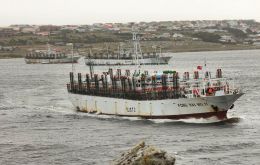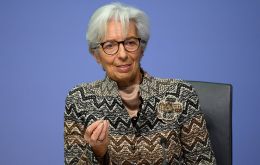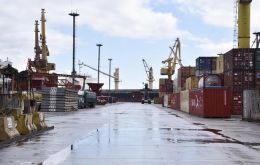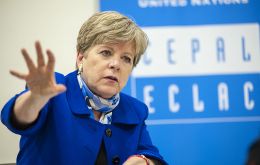MercoPress. South Atlantic News Agency
Tag: economy growth
-
Wednesday, February 24th 2021 - 08:33 UTC
UK planning to spend billions to prop the economy over the next four months

The United Kingdom is set to spend billions of pounds in extra support for the economy over the next four months, as pandemic curbs pushed unemployment to its highest level of almost five years. The chancellor of the exchequer Rishi Sunak will set out the details in his Mar 3 budget.
-
Saturday, February 6th 2021 - 07:15 UTC
Falklands' GDP in 2018 reached £254.7 million with a real growth rate of 3,9%

The Gross Domestic Product (GDP) of the Falkland Islands increased by 15.7% between 2017 and 2018 (in nominal terms), primarily driven by high results within the fishing sector that year, according to the recently released Falkland Islands National Accounts.
-
Tuesday, January 26th 2021 - 09:24 UTC
“Journey of recovery” in 2021 will be accompanied by a high level of uncertainty, Christine Lagarde

Christine Lagarde, president of the European Central Bank (ECB), said on Monday that the “journey to recovery” in 2021 would most likely be accompanied by a “very high level of uncertainty” before a transition to a “new economy.”
-
Monday, January 18th 2021 - 08:32 UTC
Chinese economy expands 6,5% in IV quarter and 2,3% in 2020

China’s economy grew at a faster-than-expected pace in the fourth quarter of last year, ending a rough coronavirus-stricken 2020 ahead of all major industrialized nations, as well poised to expand further this year.
-
Wednesday, November 18th 2020 - 08:48 UTC
Brazil surging out of recession strongly, according to Q3 activity data

Brazil is emerging from a recession caused by the coronavirus, Economy Minister Paulo Guedes said hours after the publication of a closely-watched indicator showing activity surged in the third quarter.
-
Wednesday, October 28th 2020 - 09:19 UTC
Bolsonaro “transformative” reforms' goal for Brazil, with a 3,5% average growth during a decade

Brazil's government on Tuesday outlined a long-term roadmap for the economy, based on three scenarios of economic and fiscal reforms that could lift gross domestic product per capita by as much as 37% over the next decade.
-
Wednesday, June 17th 2020 - 12:09 UTC
Investment inflows to Latina America forecasted to halve from US$ 164 billion

Investment flows to Latin America are expected to halve in 2020 from the US$ 164 billion received last year, according to UNCTAD's World Investment Report 2020.
-
Thursday, September 19th 2019 - 10:12 UTC
Uruguay avoids recession, but the economy is stagnant

The Central Bank of Uruguay (BCU) released the report of the country's quarterly economic situation, which reports that the Uruguayan economy grew by only 0.1% year-on-year and 0.3% in the second quarter of the year, compared to the first three months of the year, when it registered a 0.1% drop.
-
Friday, August 30th 2019 - 09:43 UTC
Brazil economy rebounds in second quarter spurred by construction and industrial production

Brazil’s economy rebounded strongly in the second quarter after having shrunk in the first, official figures showed on Thursday, indicating Latin America’s largest economy comfortably avoided falling back into recession.
-
Thursday, August 1st 2019 - 09:36 UTC
South America expected to grow 0.2% in 2019, forecasts CEPAL

Hit by five years of “economic slowdown,” Latin America's economy will grow by barely 0.5% this year, the United Nations economic commission for the region said on Wednesday, well below the 1.3% projected in April.
